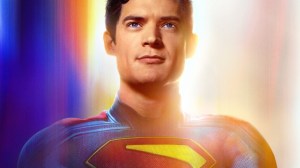A good thriller should put you on the edge of your seat, remote in your hand and ready to turn it off because you can’t take the suspense anymore. This was my experience playing Observation. If you can look past a little low-budget space jank, there’s an original sci-fi story that cleverly brews together different sci-fi cliches and an engulfing atmosphere into something more than the sum of its parts. Observation isn’t technically a scary game, but it tricks you into believing it is, and that’s all you can really ask for from a true thriller.
Videos by ComicBook.com
In Observation, mankind is trying to become a spacefaring species before Earth becomes inhospitable. This urgency though is never a driving force for the game’s narrative, because Observation takes place entirely in space, in a space station, far away from home. You don’t play as an astronaut aboard the station though; you play as the station itself. More specifically, S.A.M., the on-board advanced AI that assists the crew in just about everything they do.

The game begins and immediately something is obviously wrong, and there’s a palpable sense things are only going to get worse. The crew is missing, and the station itself is unstable, damaged, and teeming with a foreboding atmosphere. All there is you and Dr. Emma Fisher, the only crew member accounted for.
Operating the station’s control systems and cameras, your job is to assist Emma as she tries to figure out what happened to the station and the crew that used to populate it. But of course, things are more complicated than this, and it’s obvious very quickly the situation is not only worse than you think, but worse in an inexplicable, spine-chilling sense. It’s not clear who’s good, who’s bad, or who is trying to help. You have an idea where the story is going, but not how it gets there. And developer No Code knows you’ll feel this way, allowing it to prey on your apprehension.
Now, I don’t want to spill narrative details too much, even early stuff, because not knowing what’s going on is such an important catalyst to the game’s story. I will say that No Code has managed to do something with Observation not many can do: tell an original, compelling sci-fi story. Now, don’t get me wrong, Observation isn’t out here reinventing the rocket. The thriller is more a well-realized coalescence that takes a bit here and there from various sci-fi cliches and combines them into something that feels inventive. It’s obvious what the game’s inspirations are — for example, there’s a lot of 2001: A Space Odyssey thrown into the mix — but it only ever borrows just enough.

The story is underpinned with quality writing that is brought to life with appreciable attention to detail, and there’s a sense that No Code spent as much time researching space stations as they did making a game about one. The voice acting on the other hand is inconsistent. For most parts of the game, it’s serviceable, but there’s a general lack of emotion and urgency that sometimes stuck out in a narrative where both should have been pouring out.
There’s also a few times where the story, rather uneventfully, drags a bit and stumbles into some pacing issues. The game isn’t very long — roughly seven hours — but yet the “ending” felt like it was considerably longer than the rest of the game, and that’s because the build-up wobbles and is padded with unnecessary gameplay moments. The exposition is excellent, the rising action is even better, and the climax is thrilling, but the falling action is more tumble than graceful. As for the resolution, there’s a bit of unearned vagueness, but otherwise, again, No Code manages to do something not many can by capping a thriller with a satisfactory ending.

Observation’s gameplay is mostly a vehicle for its narrative. As you assist Emma in her quest for answers, you’ll explore the various parts of the space station, hacking into cameras, control panels, modules, and more. And this is where the game’s puzzles come into play. Observation‘s puzzles aren’t going to reveal to you just how dumb you are though; they are a crossbreed between classic adventure game observation and forcing you to exercise some lateral thinking.
You’re still going to be thwarted here and there, but it’s not because the puzzle is too complex, but because it’s not obvious what you’re trying to figure out. And I will say the game is borderline obtuse sometimes, and not only does it hinder the momentum of the narrative, but it conflicts with it. If you were playing as Emma, stumbling through solutions would make sense, but you’re the station’s System Administration and Maintenance. It doesn’t make sense that sometimes you’re sitting there for 30 minutes wondering if the game is broken or you are.

As the game progresses, the puzzles become more and more multi-layered, requiring you to use a combination of your own operating system (represented in inventory-like menus), the equipment on the station, and a self-propelled spherical drone that allows you to fly around in discombobulating fashion. In fact, you spend a good amount of time in the drone — especially when you explore the exterior of the station — and some are going to undoubtedly dislike these parts of the game. The drone is ungainly, flickers when you bump into things, and is very easy to lose a sense of direction while in. This will be exasperating and tedious for some, but to me it added to the atmosphere and believability.
Over the course of the game, you’ll come across laptops, documents, data logs, post-it notes, pictures, and more that will flesh out the game’s world, characters, and even provide finer details to what’s happening. However, if you aren’t deliberate and fastidious in your exploration, you will miss a substantial amount of this, which makes the story a bit less impactful at certain plot points. Further, what is there, sometimes felt wasted. The data logs specifically don’t do a great job at exploring and illuminating different interpersonal relationships aboard the station. As a result, many of the characters feel a bit colorless and inconsequential.

What’s perhaps most impressive about the game is how well it disguises itself as a AAA experience. A small team and budget made Observation, but you wouldn’t really be able to tell that by looking at the game. The camera work, the detail of the environment, the stylistic choices that allow it to veil a lack of resources are so well done and thought out that it makes you wonder what bigger games are spending all their money on. There’s one place where No Code comes up short though: the facial animations. The lip syncing is pretty off, and faces have a deadpan, almost uncanny look. And in a story-driven, immersion-heavy game, this would normally be pretty glaring, but you’re actually not up close and personal with too many faces in Observation, so it doesn’t subtract from the experience too much.
Sci-fi is hard to mess up, but it’s harder to nail. Observation doesn’t get everything right, but it executes on what matters the most. At its best, its transports you right on the station itself, and even when it stumbles it’s held up by exemplary sound design, a captivating story, and a dedication to authenticity and creative vision that you likely won’t see from many games this year.
Rating: 4 out 5
Observation is available on PC and PlayStation 4 for $24.99. A PS4 code was provided by the publisher for the purposes of this review.









